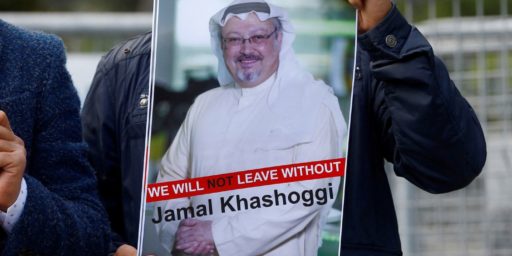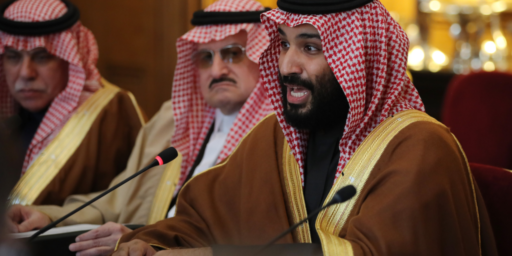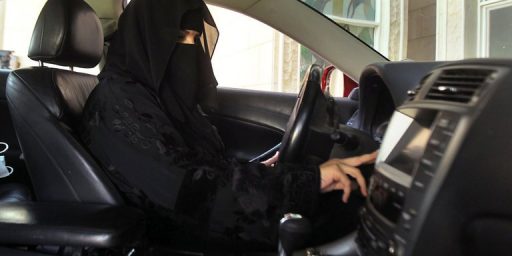Major Reforms in Saudi Arabia
Saudi King Abdullah announced a major shake-up in his government over the weekend. Among the changes was the naming of the first woman to a high government office, Deputy Minister for Girls’ Education. The promotion of a woman in a country that generally treats women as second class citizens is indeed a big step.
More interesting–and important–were changes he made in the galaxy of the religious establishment. The most far-reaching change was to re-establish the Grand Ulema Council, the body intended to offer consensus opinion and advice on the religious aspects of law and regulation. Not only does the opening of this office deprecate the power of individual clerics, but its membership was expanded to include representatives of all Sunni schools of law, taking away the monopoly power of the Hanbali School, the foundation of Saudi Arabia’s conservative, ‘Wahhabi’ establishment. The expansion does not, unfortunately, include any of the schools of Shi’ism. That, however, might come in the future.
The ultra-conservative head of the Commission for the Promotion of Virtue and the Prevention of Vice—aka, the religious police–was replaced by a more moderate individual who has already noted that his approach to the mission of the organization will be “innocent until proven guilty” and more forgiveness than punishment. Just how that plays out is yet to be known, of course, but it’s a marked change from past practice.
As conservative was the Chief Justice of the Supreme Judicial Council who most recently achieved notoriety through his statement that satellite TV broadcasters deserved to be tried and executed for the irreligious content of their programming. He was bounced from his position and replaced by Saleh bin Humaid, formerly head of the Saudi Shoura Council where he played an active role in promoting laws to protect women. Bin Humaid is himself a conservative cleric. Given his demonstrated moderation (as always, the term is used within a Saudi context), his religious authority should make it easier for him to force change.
The Supreme Judicial Council itself is about to undergo major changes. It is planned that it will be replaced by a Supreme Court that will serve to rule on the soon-to-be-codified new Saudi legal system.
It should be noted that the former head of the Supreme Judicial Council has been moved to head the Shoura Council. That’s not an unimportant position, but it holds considerably less power.
Longer-lasting changes–which will take longer to implement–were made in the Ministry of Education. A new Minister was named, this one a member of the ruling family with a long background in anti-extremist security operations. He has the clout to finally root out the extremist who have burrowed deep within the Saudi educational system, as well as having the resources to identify them. He has a new Deputy Minister, one who has led the King’s program for “National Dialogue”, intended to get Saudis publicly talking about things that had heretofore been relegated to private discussions. Top among these topics have been tolerance; dealing with differences in opinions, background, and sex; and facing up to the unexamined cultural issues that color politics and law.
Of course, the naming of a woman as a Deputy Minister of Education was something that has been highlighted in media reports. It is a big step and the first breach in a gender wall. Her remit is somewhat limited to Girls’ Education, but it is well past time that women had a say in how they were educating their daughters.
There’s no denying that Saudi Arabia has a lot of ground to cover just to catch up with international standards of human rights in the 21st C. These steps, however, do mark a clean break with the past and point to a different future. While the deficits should not be minimized, I think it important to recognize positive change as well.
You can find more information about the changes at Crossroads Arabia.





That’s seems like a hell of a lot of change all at once, what prompted it now?
I’d say offhand the last several years of promptings from the White House.
They’ve been getting those prompts for a good long time, and haven’t shown much desire or willingness to implement significant change up until now.
“I’ve been climbing this mountain for a day and a half, and only just now got to the top”.
Maybe, I don’t pay enough attention to KSA to know if they’ve been climbing that mountain for years or not, but it certainly seemed like they’ve just been sitting around the fire at base camp talking about the summit.
Or maybe, like the Supreme Court, the Saudis follow the election returns.
The question seems to be, ‘Why now?’
As anything in the KSA, it’s the result of a combination of factors, some more important than others.
The first thing, I believe, is that the King has now been in office for about five years. That’s given him a chance to consolidate his coalitions. It’s also given him time to collect the record of missteps and errors of the opposition.
As a new king, he wasn’t willing (or able) to just announce major reform. He had too many waiting and watching for anything that looked questionable. They were simply waiting to pounce. (If you wish to take lessons from this and apply them to certain reactions to a new Obama administration, please feel free to do so!)
In the time since he ascended to the throne, the country has gone through a series of terrorist attacks, most of which have been thwarted. The anti-terror activities have succeeded in chasing the Saudi offices of Al-Qaeda in the Arabian Peninsula out of the country to join with and regroup in Yemen. He’s managed to clear most of the mosques of extremist preachers–some through firing, some through jail or detention. These moves have undercut whatever threat the religious zealots might have represented.
The oil boom brought in enough money to enable the government to undertake significant developmental projects and to boost employment. While the current oil bust has pushed the country into deficit spending, there’s enough of a surplus to enable the government to avoid the worst-case problems that are soon to confront Iran, Libya, Venezuela, and non-OPEC Russia. He’s got a cushion now that he didn’t have earlier.
Conservative religious authorities have managed to shoot themselves in the foot and thus weaken their own positions. Whether it was a fatwa condemning Mickey Mouse or one that seemed to authorize the killing of TV broadcasters for bringing down social and religious values, the religious leadership had been hurt. Their misery was enhanced by boneheaded moves by the religious police that ended up pissing off moderate Saudis and even conservatives who didn’t see what was objectionable in a given case. The outward injustice of, for instance, ‘Qatif Girl’ (sentenced to jail and flogging for being with an unrelated male, but then gang-raped) disturbed the average Saudi as much as it disturbed those in the West.
Somewhere along the line, the King calculated that a tipping point (sorry) had been reached and that a little shove by him would push them out of center stage.
I think the least of the factors would have been the Obama election, though it might have played some role. Saudi Arabia has been mostly immune to US (or other Western) criticism as it knows that the US cannot do anything truly drastic against it. The consequences of drastic action would rebound on the US nearly as severely as they’d affect the KSA.
One aspect of Western opinion that might count is the upcoming UN review of Saudi human rights practices. The papers that feed into the review are mostly in and they’re not favorable to the Kingdom–how could they be? This will cause embarrassment to the government, particularly because it is on the UN Human Rights Committee. The shortfall between what is promised and what is delivered will be apparent to everyone… including other Saudis.
The most encouraging things about these changes, sweeping as they are, is that most Saudis think they are only the beginning. They’re anticipating big changes later this year. Women’s driving? Could be. Further rapprochement with the Shi’a? It could happen.
I think it definitely worth watching.
All welcome developments and hopefully a sign of things to come.
In that case we can be pretty sure it was something else.
Thanks for the analysis, Mr. Burgess. It is encouraging to feel that moderates will win out eventually.